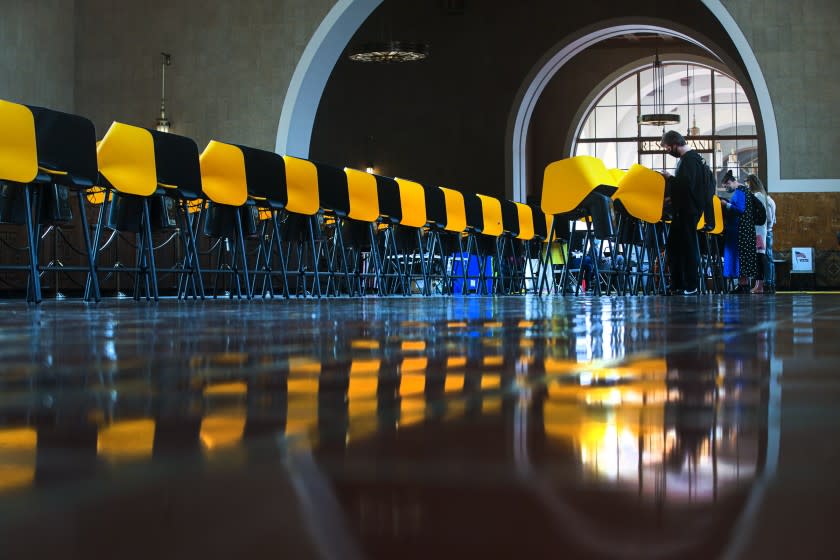All things considered, it's been a relatively peaceful day of voting (so far)

Boringness is not an inherently bad thing. Sometimes nothingness is a virtue. Especially this year.
On their final day of voting, millions of Americans proceeded to their local polling places without a problem as of Tuesday afternoon as fears of potential voter violence or intimidation largely failed to materialize amid one of the most heated presidential elections in American history.
As with many elections, there were a few isolated incidents. There was what police described as a "pushing match" between Democratic and Republican demonstrators outside one poll in Houston, witnessed by a Times reporter. In Charlotte, N.C., police reported arresting one voter who had loitered outside his polling place with a legally carried gun and who returned after being banned by a precinct official. He was charged on suspicion of trespassing.
Outside one Montgomery County, Md., polling location, "a group of individuals threw a bottle of hand sanitizer at [a] vehicle that had Trump flags," Montgomery County Police Cmdr. Sean Gagen told The Times in an email. "The individuals were stopped by officers and the people that threw the hand sanitizer were charged via a criminal citation."
But after store owners in cities across the country boarded up their windows and the White House surrounded itself with fortifications, for the overwhelming majority of Americans, voting went calmly and orderly, according to elections officials and poll-watching groups. Without violence, and largely without the kind of drama seen over the weekend with some "Trump trains" and "MAGA drags" that ended with groups of Trump supporters clashing with groups of opponents.
“Thankfully not, thankfully not," said Alora Thomas-Lundborg, senior staff attorney for the American Civil Liberties Union's Voting Rights Project, which tracks polling-place issues.
"A lot of groundwork was laid so we could see something like today," Thomas-Lundborg said. "Everyone I know who works at voting rights [groups], we’ve all been working like crazy so a day like today can happen."
In Philadelphia, where President Trump had stoked fears of mass voter fraud ("Bad things happen in Philadelphia," Trump said at one debate), voting went largely without problem.
“No major problems of any kind, no systemic problems or widespread problems of any kind that we’ve heard about," said Kevin Feeley, spokesperson for the Philadelphia City Commissioners, a board that oversee elections there. “So far, knock on wood, things seem to be going well.”
So, too, in Florida's most populous county, Miami-Dade, where county elections department spokesman Robert Rodriguez said officials didn't see significant problems.
"No, we haven’t had anything," Rodriguez said. The biggest problem were voters complaining that some political supporters were near the 150-foot no-electioneering zone around polling locations, Rodriguez said. “People complain there’s voter intimidation, [but] within that 150-foot line, we have not had issues today."
A significant reason for that, Rodriguez thinks, is because more than 1 million of the county's 1.5 million eligible voters voted early, leaving significantly lower foot traffic at polling locations where voters from opposing parties might encounter one another.
“I’ve had a lot of media calling me, 'I can’t find lines, where are the lines?'" Rodriguez said. "The answer is the same: There isn’t really any.”
It's been a similar story across the rest of the South, according to Alberto Lammers, media director for the Southern Poverty Law Center, which was also monitoring polling issues.
“Just regular election day issues — long lines, maybe some people getting a little close to the polling stations," Lammers said. “It’s just very, very minor. Nothing systemic.”
But casting votes is one thing. How people react to the results might be another.
“If folks want to go out into the streets and let it be known their opinion of the election, we think they have a 1st Amendment right to be there, so we’ll be monitoring the response to lawful protest," said Thomas-Lundborg. "We’re definitely going to keep our eyes open after today for whatever's the aftermath of the election.”
Times staff writer Molly Hennessey-Fiske in Houston contributed to this report.
This story originally appeared in Los Angeles Times.

